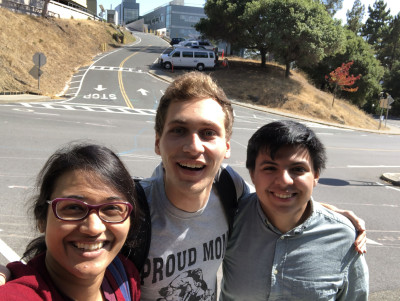
Professor Tanzima Islam (left) and her students Quentin Jensen (middle) and Alexis Ayala (right) at Berkeley Lab in 2019
Tanzima Islam was a professor at Western Washington University when she came to Berkeley Lab with two undergraduate students as part of the Sustainable Research Pathways (SRP) program in the summer of 2019.
At the time, her students were all new to research. And since Islam’s expertise lies in improving the performance of application codes on supercomputers, she and her mentor, Berkeley Lab’s Khaled Ibrahim, devised a project to develop an open-source analysis and visualization tool for examining the performance of application codes on supercomputers—called Dashing.
“My SRP experience at Berkeley Lab was extremely productive and a defining moment for my and my student’s careers. We released software that we developed that summer and published papers. It is currently on GitHub and available for anyone to use,” said Islam. “This work also served as the backbone for my early career research and inspired my students to pursue their Master’s degrees and potentially their PhD.s.”
Islam, now a Texas State University professor, is one of 83 esteemed scientists from across the country selected to be part of the Department of Energy’s (DOE’s) Early Career Research Program. She will develop a tool called INTELYTICS, which incorporates machine learning techniques to automatically analyze an application’s performance and recommend solutions for utilizing computing resources efficiently.
“When applying for the DOE Early Career program, you must demonstrate a track record: you need to identify the DOE users that need your tool, to show that you’ve published papers in this space, given talks, and published software,” said Islam. “Thanks to SRP and Dashing, I had proof points for all these criteria.”
The success of her SRP experience at Berkeley Lab inspired Islam to participate in the program again with a new set of students. This summer, she and three of her Texas State University students are spending the summer at Brookhaven National Laboratory as part of the SRP-HPC program working on integrating Dashing into the lab’s exascale performance and anomaly detection infrastructure.
Islam also used her SRP network to connect her Texas State University graduate student, Mohammed Zaeed, with Berkeley Lab researchers Sherry Li and Yang Liu. This summer, Zaeed is working with Li and Liu to integrate Dashing into Berkeley Lab-developed GPTune, an open-source software tool for optimizing large-scale high performance computing codes.
“This program has a profound impact on students. For many, it’s the first time they’ve worked on important problems. Their customers are national lab scientists, and they think your work is valuable, it gets integrated into their workflows, it gets published, this goes a long way toward building confidence in an undergraduate student researcher,” said Islam. “This opportunity has helped expand my professional network and generate new ideas for future collaborations. The benefits of this program are really beyond imagination.”
About Berkeley Lab
Founded in 1931 on the belief that the biggest scientific challenges are best addressed by teams, Lawrence Berkeley National Laboratory and its scientists have been recognized with 16 Nobel Prizes. Today, Berkeley Lab researchers develop sustainable energy and environmental solutions, create useful new materials, advance the frontiers of computing, and probe the mysteries of life, matter, and the universe. Scientists from around the world rely on the Lab’s facilities for their own discovery science. Berkeley Lab is a multiprogram national laboratory, managed by the University of California for the U.S. Department of Energy’s Office of Science.
DOE’s Office of Science is the single largest supporter of basic research in the physical sciences in the United States, and is working to address some of the most pressing challenges of our time. For more information, please visit energy.gov/science.









